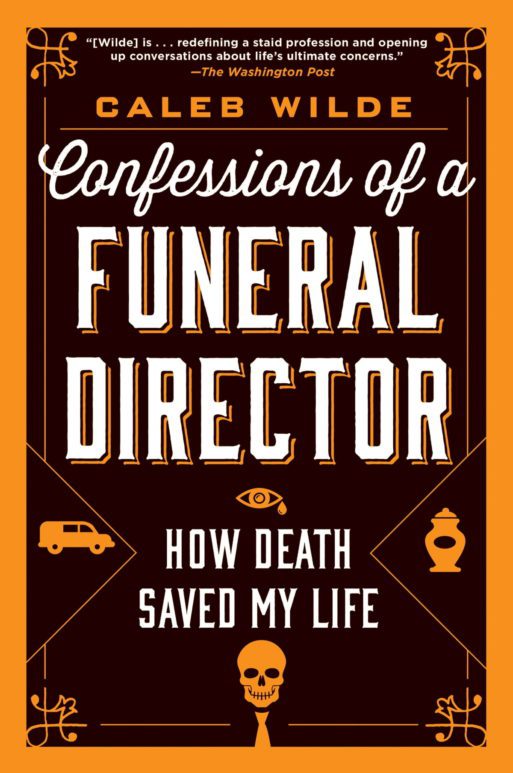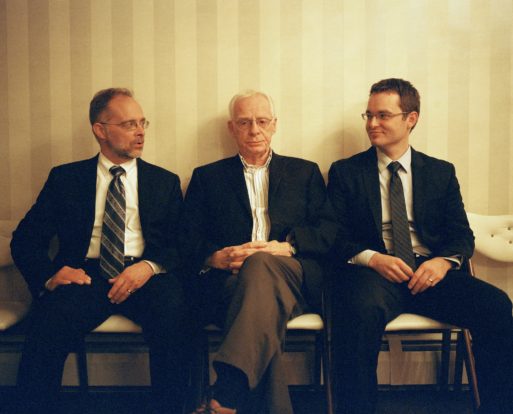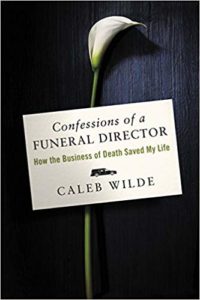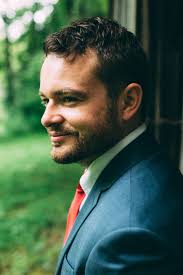 Caleb Wilde is a sixth-generation funeral director who was initially leery about following in his father’s footsteps and continuing the family business. Wilde details this journey and much more in his book “Confessions Of A Funeral Director: How the Business of Death Saved My Life.”
Caleb Wilde is a sixth-generation funeral director who was initially leery about following in his father’s footsteps and continuing the family business. Wilde details this journey and much more in his book “Confessions Of A Funeral Director: How the Business of Death Saved My Life.”

Caleb Wilde (right), his father (left) and grandfather (center)
Credit: medium.com
“Confessions Of A Funeral Director” is an autobiographical account of Wilde’s ascension to funeral director and also an intimate glimpse into the funeral industry as a whole. He offers various perspectives on both living and dying well, and recounts stories and experiences with people who have died and their families.
Interestingly, both sides of Wilde’s family were in the funeral home business. Based in Parkesburg, Pennsylvania (roughly an hour outside Philadelphia), both of Caleb’s grandfathers were funeral home directors, and his father became the fifth-generation director of the Wilde Funeral Home.
In fact, Wilde’s grandfathers were competitors in the Parkesburg region before his mother and father met. Wilde’s maternal grandfather was director of the Brown Funeral Home. Despite the business competition, everything worked fine between the families.
Wilde details his struggles in coming to grips with joining the family business. Throughout “Confessions Of A Funeral Director” he mentions many times that he’d wondered whether or not it was the right decision for him.
Growing Up Around Death
Growing up around death impacted Wilde immensely. Both the Wilde and Brown Funeral Homes were the hubs of the family businesses and also his grandparents’ homes. One of Wilde’s favorite childhood games was playing hide-and-seek with his cousins in the casket room of the Brown Funeral Home.
 Family gatherings were held at their homes, so seeing dead bodies was a common occurrence for Caleb and his cousins. This proximity to death early on in life was a defining aspect of his youth. However, since it was the family business, death for him was very much about work and not personal. He writes:
Family gatherings were held at their homes, so seeing dead bodies was a common occurrence for Caleb and his cousins. This proximity to death early on in life was a defining aspect of his youth. However, since it was the family business, death for him was very much about work and not personal. He writes:
Two of my closest middle school friends lost family members, a father for one, a sister for the other. But I didn’t lose my father. I didn’t lose my sister to death. For me, death was work. Death care was the family tradition…Even though death wasn’t personal, the idea of death saturated my youth. And the thought of what might come after death consumed me, and eventually broke me.
It’s the idea in that final sentence that Wilde obsessed about as a youth and into his teenage years. He became sensitive to the idea of death — that it can come at any time. And so he never had the “carefree” attitude that many children have; the idea of death and mortality hung in his mind constantly. His family was also deeply religious. So the constant exposure to both death and the idea of going to Hell dominated his young mind. Much of “Confessions Of A Funeral Director” revolves around Wilde’s contemplation about his purpose in life and reconciliation with God and religion.
Death Negative vs. Death Positive
One major theme of “Confessions Of A Funeral Director” is Wilde’s ideas of “death negative” and “death positive.” These are essentially two methods of viewing and thinking about death.
He asserts that much of our society revolves around the death negative narrative. “Even though I grew up around death,” he writes, “I was just as susceptible as anyone to what I call the ‘death negative narrative’ that so many of us have come to believe.”
Wilde continues to say how most people only see tragic and horrific deaths on TV and in the media. Bad deaths become the norm, so people only associate death with something terrible. He also writes of how fearing death is part of our biology, so it should seem natural that people think of death as bad. “We fear death because we don’t know it, we don’t see it, and we don’t touch it,” he writes. “And what we don’t know, we’ve painted in broad strokes of darkness and negativity.”
Wilde had the same perspective of death when he was younger. And he found that he needed to change that viewpoint, to tell himself a new story of death. This idea is what ultimately led him to pursue the family business of funeral directing: to find a death positive narrative.

Credit: deathbydesign.com
“Death is like mud; it’s dirty, messy, and incredibly tough to walk through,” he writes, “but, surprisingly, it holds vital ingredients to life, and when seeds are planted, it can help sprout new life.”
Wilde is not trying to say that death is easy. He says that death is probably the hardest thing we have to deal with. But he is saying that we’ve heard an incomplete narrative.
And that is what most of “Confessions Of A Funeral Director” is about. It’s stories of families and people Wilde has worked with that taught him about positive and even good deaths. “Good” in the sense that they created strong communities, taught people to live life to the fullest and even helped to erase the fear of death in others.
Much of “Confessions Of A Funeral Director” is about Wilde’s personal journey. Over the course of his relative short time in the funeral industry, he’s learned countless things about both life and death. He’s come to see that there can be beauty in death, and that it’s not entirely something to fear and dread.
“Confessions Of A Funeral Director” is at times sad, at times funny and witty, and is a tremendous personal account about life in the death industry. The stories of the families Wilde included in the book are moving, and it’s very moving to see the ways in which death can bring people together. I’d recommend this book to anyone who’s interested in the death industry, but also to anyone who enjoys personal journeys and the power of love.

 “Confessions Of A Funeral Director” by Caleb Wilde
“Confessions Of A Funeral Director” by Caleb Wilde


 Final Messages of the Dying
Final Messages of the Dying
 Will I Die in Pain?
Will I Die in Pain?















